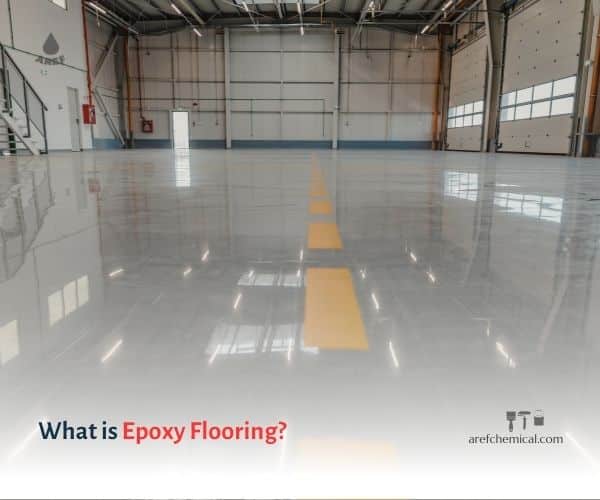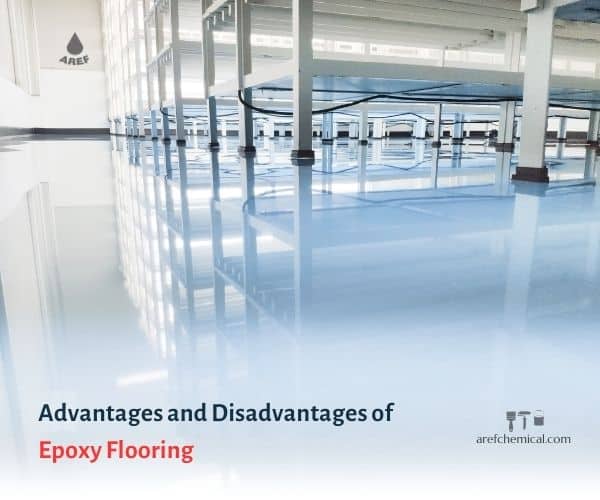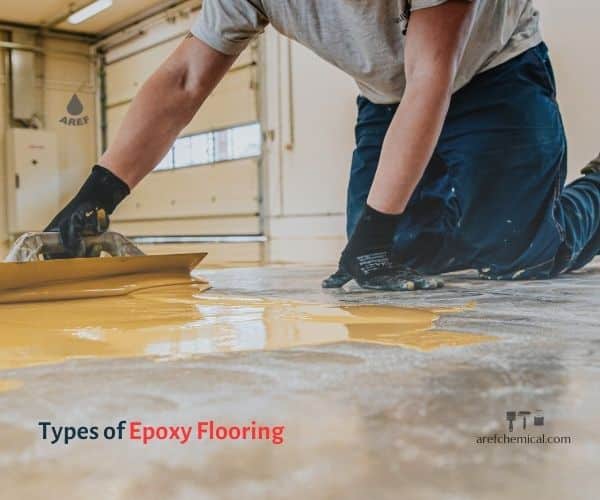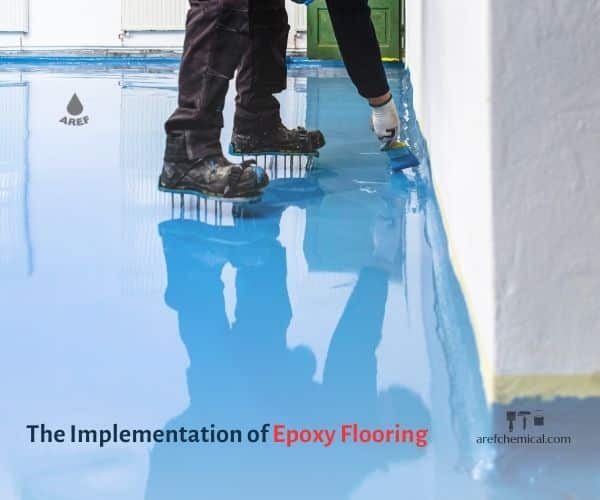Epoxy floor coating: Durable and aesthetic solution for interior and exterior surfaces
Epoxy floor coating is a modern, resistant, and beautiful type of coating that can be applied on surfaces such as stone, mosaic, cement, ceramics, concrete, and metals. Whether for domestic or industrial use, it creates a smooth, seamless, uniform, and long-lasting surface. This type of flooring is very cost-effective and efficient in terms of durability and aesthetics. The term epoxy flooring is often used to describe various flooring systems composed of epoxy resins with different performances. This product is suitable for cases where the floor space requires not only high resistance and durability but also a beautiful and transparent appearance. In this article, we will discuss the advantages and disadvantages of epoxy flooring, the implementation of epoxy flooring, and people’s opinions about it.
What is epoxy flooring?
Epoxy floor coating is a modern, durable floor covering that consists of a combination of epoxy resin and hardener. These two components are mixed together and create a smooth and uniform layer on the underlying surface such as concrete, stone, or mosaic.
This coating is very resistant to corrosion, wear, impact, and breakage and can be used in dry and wet environments, high and low temperatures, industrial and commercial. Also, because of its smoothness and seamlessness, epoxy flooring is easy to clean and looks very beautiful. Epoxy floors with their unique features have many applications in residential, commercial, and industrial environments.
Advantages and disadvantages of epoxy flooring
Like other products, this flooring has advantages and disadvantages. In the following, we will discuss this topic completely.
Advantages of Epoxy floor coating
High resistance: These floors are highly resistant to wear, impact, scratches, and chemicals, making them ideal for high-traffic areas such as parking lots, warehouses, factories, and hospitals.
Durability: Epoxy floors are long-lasting and easy to clean. With proper care and maintenance, they can be used for many years without needing to be replaced.
Variety of designs and colors: These floorings are available in different colors and designs and can be used to create a unique and beautiful look in any space.
Hygiene: Non-porous and seamless nature are among the other benefits of epoxy flooring, as they prevent the growth of bacteria and fungi. This feature makes them suitable for places where hygiene is of great importance, such as hospitals, laboratories, and food industries.
Easy to clean: The smooth and non-absorbent surface of this type of flooring makes it very easy to clean.
Safety: Epoxy floor coating surfaces are not slippery, reducing the risk of tripping and falling.
Thermal and cooling insulation: Epoxy flooring can act as thermal and cooling insulation, helping to keep the environment cool or warm during the hot and cold seasons.
Seamless surface creation: This type of flooring is applied uniformly on the surface, without any seams or cracks, making it ideal for places that require strict hygiene compliance.
Resistant to slip: By adding special additives to epoxy flooring, it can be made slip-resistant, making it suitable for moist or sloped areas.
Disadvantages of Epoxy floor coating
Cost: Epoxy floorings are more expensive compared to other types of flooring such as ceramic or laminate.
Installation: This type of flooring needs to be installed by experienced professionals as the installation process is complex.
Chemicals: Epoxy resin and hardeners can contain harmful chemicals, so proper safety equipment should be used when working with them.
Unpleasant odor: Epoxy resin has an unpleasant odor that can be bothersome for some people. This odor typically dissipates within 24 to 48 hours after installation.
Resistant to slip: By adding special additives to epoxy flooring, it can be made slip-resistant, making it suitable for moist or sloped areas.
Applications of Epoxy floor coating
Epoxy floor coating has a variety of uses in different environments due to its unique features. Some of its main uses are:
Residential houses: Epoxy flooring is a suitable option for use in kitchens, bathrooms, garages, and other residential areas due to its beauty, durability, and ease of cleaning.
Commercial environments: This type of flooring is also used in shops, restaurants, offices, sports centers, and other commercial spaces.
Industrial Environments: Epoxy floors with high chemical and impact resistance are ideal for use in factories, warehouses, laboratories, and other industrial environments.
Health places: This type of flooring is suitable for use in hospitals, clinics, laboratories, and other health places due to its non-porous nature and ease of cleaning.
Ultimately, epoxy floor coating is a great choice for those looking for durable, beautiful, and hygienic flooring with a wide range of uses. Despite the relatively high price and complicated installation process, the advantages of this type of flooring outweigh its disadvantages.
Types of epoxy flooring
Epoxy floors are divided into different types based on the type of resin, application, and appearance. Also, due to the variety of applications and many benefits, they are produced and supplied in different types. Each type of flooring has its own characteristics and uses. Here are some of the most common types of epoxy flooring:
- Simple epoxy flooring:
It is one of the simplest and cheapest types of flooring. Plain epoxy is available in a variety of colors and is suitable for low-traffic environments, such as residential homes.
- This type of flooring is the simplest and most common type of Epoxy floor coating.
- It consists of epoxy resin and hardener simply and without any special additives.
- It has a smooth, uniform, and shiny surface.
- Available in different colors.
- Due to the reasonable price, it is suitable for use in various residential, commercial and industrial places.
- Colored epoxy flooring:
This type of epoxy flooring comes in a variety of cheerful colors and can be used to create attractive designs and patterns on the floor. Colored epoxy flooring is suitable for environments such as cafes, restaurants, and kindergartens that seek to create a happy and pleasant atmosphere.
- This type of flooring is as simple as epoxy flooring, except that it can be applied in various colors and desired designs.
- This type of flooring is used to create diversity and beauty in the environment.
- It is suitable for use in residential houses, stores, restaurants, and other commercial environments.
- Metallic epoxy flooring:
This product looks like metal and can be used to create a modern and luxurious atmosphere. Metallic epoxy floor coating is suitable for environments such as offices, hotels, and theaters.
- Anti-slip epoxy flooring:
This type of Epoxy floor coating: has a rough and uneven surface that prevents slipping and falling. Anti-slip epoxy flooring is suitable for environments such as bathrooms, swimming pools, and stairs.
- This type of flooring creates an anti-slip surface by adding special additives to the epoxy resin.
- Suitable for use in wet or sloping places, such as bathrooms, pools, and ramps.
- Prevents accidents caused by slipping and falling.
- Antistatic epoxy flooring:
There are no electrostatic charges in this type of epoxy flooring and it is suitable for environments where delicate electronics are handled, such as laboratories and operating rooms.
- This type of epoxy flooring is created by adding conductive materials to epoxy resin.
- Reduces electrostatic charge and prevents dust accumulation.
- Suitable for environments sensitive to static electricity, such as server rooms and electronic equipment.
- Self-leveling epoxy flooring:
Fortunately, this epoxy floor automatically makes the surface smooth and uniform, and it does not require much effort to install. Self-leveling epoxy flooring is suitable for large areas such as gyms and warehouses.
- This type of flooring creates desired designs on the surface of the flooring using special techniques.
- It has a very high variety in design and color.
- It is suitable for use in residential houses, commercial environments or hotel lobbies.
- Patterned epoxy flooring:
This type of epoxy flooring is decorated with different designs and motifs using different techniques such as stencils, printing, and colored resin. Patterned epoxy flooring can create a unique and eye-catching atmosphere and is suitable for environments such as homes, offices, and stores.
- This type of flooring gives the environment a feeling of depth and dimension by using 3D images.
- It has a very attractive and unique appearance.
- Suitable for use in residential houses.
- 3D epoxy flooring:
This type of epoxy flooring creates a real and amazing atmosphere by creating 3D images on the floor. 3D epoxy floor coating is suitable for environments such as homes, cafes, and restaurants that seek to create a unique atmosphere.
- This type of flooring conveys depth and dimension to the environment by using 3D images.
- It has an attractive and unique appearance.
- Suitable for use in residential houses and restaurants
Epoxy floors are placed in different categories, each of which has its own characteristics and uses. Here we introduced some of the most common types of epoxy flooring.
Implementation of epoxy flooring
The implementation of epoxy flooring includes various steps that must be done carefully and delicately so that the final result is desirable and of high quality. Here is a brief description of the steps of epoxy floor coating:
1. Surface preparation:
The first step to applying epoxy flooring is to prepare the surface. The surface must be completely clean, dry, and free of any dirt, grease, and sticky substances.
Defects and cracks in the surface must be filled using suitable materials.
The surface should be leveled to make it completely smooth and even.
2. Primer:
After preparing the surface, a layer of epoxy primer is applied on the surface.
Primer helps better adhesion of epoxy resin to the surface.
3. Implementation of the middle layer:
After the primer is completely dry, the middle layer of epoxy resin is applied on the surface.
This layer should be spread evenly over the entire surface.
4. Adding additives (optional):
If needed, various additives such as anti-slip materials, conductive materials, or pigments can be added to the epoxy resin at this stage.
5. Implementation of the final layer:
After the middle layer is completely dry, the final layer of epoxy resin is uniformly applied on the surface.
6. Curing:
After applying the final layer, the epoxy resin must be given time to fully harden and dry.
This process usually takes 24 to 48 hours.
Important points in the implementation of epoxy flooring:
Epoxy flooring should be installed by experienced and trained people.
Use quality and standard materials.
Follow the instructions of the epoxy resin manufacturer.
Control the temperature and humidity of the environment.
Use appropriate protective equipment.
By following these tips, you can install quality and durable epoxy flooring in your environment. The steps mentioned above are general and may change depending on the type of epoxy flooring and environmental conditions.
People’s opinion about Epoxy floor coating
Epoxy flooring has received positive reviews from users due to its many advantages. All in all, epoxy flooring is a great choice for those looking for durable, beautiful, easy-to-clean, and hygienic flooring. Despite its disadvantages, the advantages of this type of flooring far outweigh its disadvantages.
In addition, many people are also satisfied with the beauty and modernity of epoxy flooring. This type of flooring can give a stylish and luxurious look to your environment.
To summarize people’s opinions about epoxy flooring, we can say that most people are satisfied with this type of flooring and recommend it to others. Of course, some people believe that the price of epoxy flooring is high, and considering its durability and quality, it is worth it and its implementation requires expertise.
Is epoxy flooring repairable?
Yes, epoxy flooring can be repaired. If the epoxy floor coating is damaged or damaged, you can restore it to its original condition by repairing and refinishing it. These repairs usually involve filling cracks, repairing wounds, or even replacing damaged parts. If your epoxy flooring was installed in an industrial or commercial environment, it may require professional repairs. In any case, considering the strength and durability of epoxy, repairing it can be a cost-effective solution.
final word
Epoxy floor coating is an excellent solution for covering all types of floors, including industrial, commercial, and residential. This type of flooring has been able to attract many customers with features such as resistance to wear, impact, and heat, anti-slip, anti-absorption of liquids and low vulnerability, easy cleaning, and long life. Considering the advantages and disadvantages of epoxy flooring as an affordable and quality option, it is considered one of the best options for floor covering.








12 Responses
This coating is very resistant to corrosion, wear, impact, and breakage and can be used in dry and wet environments.
https://behdama.com/%d9%be%d9%85%d9%be-%d8%a7%d8%b3%d8%aa%d8%ae%d8%b1/
great epoxy flooring can be repaired.
I think Epoxy floor coating is excellent solution for covering all floor
https://behdama.com/%d9%be%d9%85%d9%be-%d8%a7%d8%b3%d8%aa%d8%ae%d8%b1/
so great
so great
https://behdama.com/%d9%be%d9%85%d9%be-%d8%a7%d8%b3%d8%aa%d8%ae%d8%b1/
I agree with you 👏🏻
Epoxy floor coatings beautify the floor, thank you
thank you
https://behdama.com/%d9%85%d9%82%d8%a7%db%8c%d8%b3%d9%87-%da%a9%d9%88%d9%84%d8%b1-%da%af%d8%a7%d8%b2%db%8c-%d9%88-%da%a9%d9%88%d9%84%d8%b1-%d8%a2%d8%a8%db%8c/
good thanks
https://daroosf.com/%D8%A7%D8%B3%D8%AA%D8%B1%D8%B3/
exactly
https://daroosf.com/%D8%AE%D9%88%D8%A7%D8%A8-%D8%A2%D9%84%D9%88%D8%AF%DA%AF%DB%8C-%D8%AF%D8%B1-%D8%B1%D8%A7%D9%86%D9%86%D8%AF%DA%AF%DB%8C/
fabulous
https://daroosf.com/%D8%A7%D8%B3%D8%AA%D8%B1%D8%B3/
It’s very fascinating.
https://daroosf.com/%D9%85%DA%A9%D9%85%D9%84-%D8%A8%DB%8C%D9%88%D8%AA%DB%8C%D9%86/